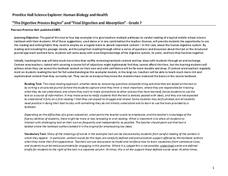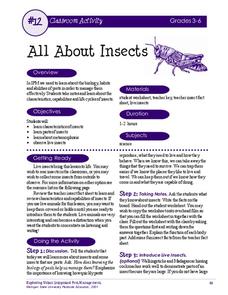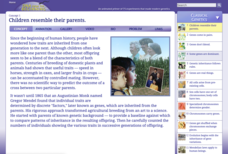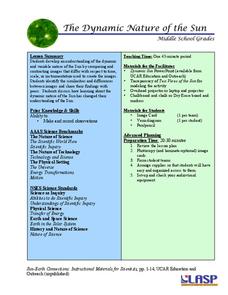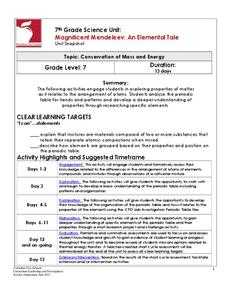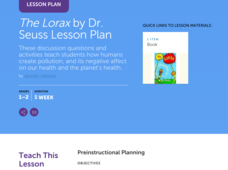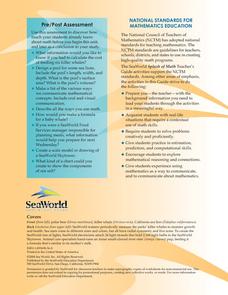Scholastic
Study Jams! The Rock Cycle
Rock out with a song, video, and quiz about the rock cycle. Learn how it is similar to recycling, the different kinds of rocks, and how they form. There is a karaoke feature that allows learners to sing along, helping to cement the...
Columbus City Schools
Get Your Organisms Organized
From large to small, show your class how to organize them all! Included within the guide is everything you need to take their knowledge of classification from the cellular to the species level. The worksheets focus on building vocabulary...
Virginia Department of Education
Atomic Structure: Periodic Table
The fifth lesson of seven in the series outlines an in-depth analysis of the periodic table. After direct instruction, pupils take turns practicing in the group before beginning independent study. The assessments include a quiz and an...
EduGAINs
Go Eco! Ecosystems
How is a movie theater like a desert biome? Compare systems to ecosystems with a set of activities that focuses on accessing multiple intelligences and building upon knowledge. As learners discuss the ways elements of an ecosystem depend...
Savvas Learning
"The Digestive Process Begins" and "Final Digestion and Absorption"
Want your class to digest text more thoroughly? Middle schoolers learn about the digestive system in the lesson and reinforce informational text reading skills through a variety of strategies. They engage in a close reading approach,...
Michigan State University
All About Insects
Insects are the focus of an activity that looks deep into the anatomy and metamorphosis of everyday bugs. Two worksheets reinforce knowledge obtained through a teacher-guided grand conversation and insect observation.
Earth Day Network
Healthy Earth, Sick Earth
Earth is sick and needs our help! Read the children's book Planet Earth Gets Well to explain the various problems facing the planet, discussing what young conservationists can do to heal the planet along the way. A great Earth Day...
Chicago Botanic Garden
Are You Bigfoot?
Scholars independently explore several websites to calculate their ecological footprint. Using their new found knowledge, they answer six short-answer questions and take part in a grand conversation with their peers about how our...
US National Library of Medicine
Genetic Traits in Harry Potter
Explore human genetics through the world of Harry Potter. A thorough lesson develops the introductory concepts of genetics using characters of the popular book series. Learners study topics from DNA and chromosomes to Punnett Squares and...
Starry Night Education
The Stars
Three astronomy activities in one resource! Here you will find one hands-on activity, one demonstration, both with discussion questions, and one activity worksheet. During these lessons young scientists discuss how stars are different,...
Pearson
The Skeletal and Muscular Systems
Introduce future doctors to medical terminology and phrases associated with the skeletal and muscular systems. As they work through a series of worksheets and exercises, high schoolers apply their knowledge of the bones of the human body...
Florida International University
Design Your Own
Apply scientific principles to designing an experiment to study organisms living on the coral reef in our oceans. Through reading, individuals learn about the coral reef ecosystem and important factors that affect its function. Using the...
Cold Spring Harbor Laboratory
Children Resemble Their Parents
Gregor Mendel's work revolutionized agriculture from an art to a science. Explore Mendel's work with an interactive lesson that includes animations, video, and practice problems. The instruction describes the early discoveries that...
Agriculture in the Classroom
"Steer" Toward STEM: Careers in Animal Agriculture
Think like an engineer and an agricultural scientist over the course of 12 lessons in a STEM based unit. Young scientists take on the roles of animal physiologists, animal geneticists, agricultural engineers, animal nutritionists, and...
PHET
The Dynamic Nature of the Sun
In this second lesson plan of the series, pupils learn to observe similarities and differences in photos of the sun and record them in a Venn diagram. Then, small groups practice the same skill on unique images before presenting their...
National Geographic
Plant Life
Looking for a guide to pair with non-fiction concept books? Intended to go with science-based leveled text mentioned in the resource, a unit allows for the study of plant life while enhancing academic vocabulary, language skills, and...
Columbus City Schools
Magnificent Mendeleev: An Elemental Tale
Discover how the periodic table tells the story of its elements. Learners begin by studying the makeup of several mixtures. Their analysis leads to a discussion of elements and the periodic table. As they dig deeper, they understand the...
American Forest Foundation
Who Speaks for the Trees?
Help young conservationists appreciate the important role that trees play in ecosystems around the world with this collection of six engaging activities. From a shared reading and class discussion of Dr. Seuss' The Lorax, to in an depth...
National Institute of Open Schooling
Chemical Arithmetics
Substances with the same empirical and molecular formula must be differentiated by their structural formula. Part two in a series of 36 has pupils using chemical formulas to calculate how much of a compound is present in a given...
American Museum of Natural History
What Do You Know About Earth?
Time to rock and roll! Young scientists test their knowledge about rocks found on Earth and what they tell scientists. A 10-question quiz focuses on the different types of rocks, how they are formed, and what they are made of.
Scholastic
The Lorax by Dr. Seuss Lesson Plan
Celebrate the whimsical world of Dr. Seuss with a lesson that features the memorable tale of The Lorax. After listening to a riveting read-aloud, scholars take part in a grand conversation about the story and environment. Then they...
Columbus City Schools
Geological Effects of Plate Tectonics
Don't get your classes all shook up about plate movement, instead use a thorough unit that guides learners to an understanding of plate tectonics. The lessons incorporate a study of the types of plate boundaries and their effects on the...
Sea World
Splash of Math
How can kids use math to learn about marine life? Combine math skills with science lessons in a resource featuring activities about life in the sea. Kids graph and calculate data, solve complex word problems, measure geometric shapes,...
Serendip
A Scientific Investigation – What Types of Food Contain Starch and Protein?
You are what you eat, as they say! Are you more starch or more protein? Young scholars use their knowledge of each component to test different foods for their content. Using multiple indicators, individuals describe the protein and...






